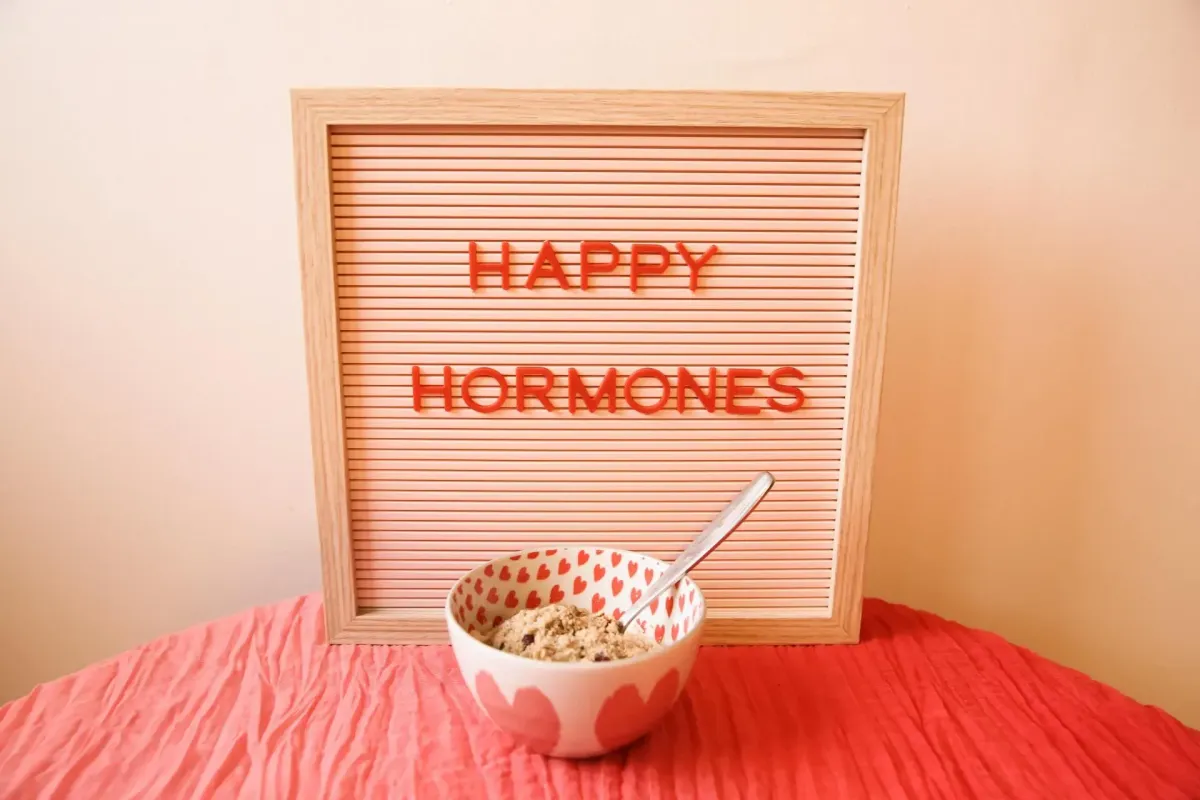READ UP ON THE LATEST HORMONE AND THYROID NEWS!

Everything you wanted to know about your gut/hormone connection
There is a huge connection with gut health and hormones.
Think about this fact: 80% of your immune system actually is housed in your gut. So that's why when your gut is off, you can get a lot of inflammation, as well as auto-immune conditions. Hashimoto's thyroiditis , for example, is the autoimmune aspect of hypothyroidism (learn more about the difference between Hashimotos and hypothyroidism in this YouTube video ).
Because there’s so much of your immune system in your gut, it has a direct, massive connection to your thyroid, and therefore, to your thyroid hormones.
Another fun fact: there are 80 million neurons housed inside your gut. That's a lot of neurons! That’s why your gut is referred to as your second brain.
Your gut can function independently of what your brain is doing because it has so many neurons. That’s why it's so important to make sure that you're really honing in on your gut health and taking care of it. If the gut health is poor, it can throw pretty much everything in the body off.
Metabolizing and eliminating hormones in the gut
A lot of your hormones are actually metabolized and eliminated through your digestive tract.
Think about something like estrogen. When you use estrogen, you need to get rid of it, and that happens through bowel movements.
If you're constipated and if the gut is inflamed, you're not going to clear that hormone. Used estrogen re-circulating throughout the body is not a good thing, as it can give a lot of women estrogen-dominant symptoms.
You need to make sure that you're constantly having bowel movements so that you are getting rid of toxins and used hormones, including estrogen.

Breaking through the gut barrier
The lining of the gut (the intestines) is a barrier to other parts of the body. When the gut health is really off and things are inflamed, this lining becomes permeable.
This can happen a lot with hypothyroidism, especially with Hashimoto's. Almost everyone with Hashimoto's actually does have something like this and it's called leaky gut. Particles leak out and then get in areas of the body they're not supposed to be in.
And what happens? Your body turns on an inflammatory response... If you’re healthy.
If you already have an auto-immune condition, you're already in this inflammatory response and that's why people can actually develop Hashimoto's with or without having just straight hypothyroidism to begin with.
All because of a leaky gut.
Gut health and thyroid hormones
When you have this really big imbalance of your good bacteria and your bad bacteria in your gut, that actually reduces the conversion of your inactive T4 to your active T3.
You only make about 20% active T3 so you have to have a conversion of thyroxine (T4) to triiodothyronine (T3). Well, a lot of that conversion can happen inside your gut - over 20%. (Not sure what T3 and T4 are? This is a great article that breaks down how the thyroid works.)
So, if the gut flora is poor (gut dysbiosis) you're going to end up having a big reduction in thyroid hormone conversion.

Photo by Tamas Pap on Unsplash
But that’s not all...
In addition to the reduction in hormone conversion, when there's all this inflammation, it actually reduces the overall amount of your T3 - your active thyroid hormone.
When you have inflammation, you're under a chronic stress response, causing cortisol to go up. Cortisol is your fight-or-flight response. It's your stress hormone. And it increases reverse T3. This is when your active T3 reverts backwards to the inactive form of T3. Learn more about stress and hypothyroidism in this video.
Back to the BMs, when you are constipated, you also can get a really large rise in thyroid-binding globulin which binds to your actual thyroid hormone, removing a portion of this hormone and leaving you without enough to use. So, this is one more reason why you need to make sure that you're addressing constipation as soon as it happens.

Photo by Maddi Bazzocco on Unsplash
Let’s talk solutions....
So what are some things that you can do about all of this?
First, address the inflammation in the gut by determining if you have any food sensitivities, eliminating both those foods and other inflammatory foods. This could mean gluten, sugar, dairy, processed foods, even alcohol, which can all be very, very inflammatory.
Second, repair the gut using things like superfoods to settle the stomach lining down. Bone broth, marshmallow root, aloe, and slippery elm are great for this!
Then, nourish your gut! Eat lots of good probiotic and prebiotic foods. Fermented foods (kimchi, sauerkraut and kombucha, for example) are great probiotics. If you have to utilize a probiotic itself in pill form, I do recommend something like a spore-based probiotic. They're very absorbable. They do really well on almost everyone. Prebiotics is a form of dietary fiber - here is a great list to check out before your next trip to the grocery store.
But you also may need to turn off some of that cortisol! Try making some lifestyle changes that are within your control to reduce your stress levels. This could mean doing some meditation or slow yoga before bed. It could mean swapping cortisol-spiking workouts with something more sustaining. Do whatever you can to reduce your stress level and bring that cortisol down. Your gut and hormones will thank you.
So, when it comes to our gut and hormones, there is a massive, direct relationship. By supporting gut health we can also start supporting thyroid function and overall hormone function, too.
This is one reason why we need to look at thyroid health holistically. The body is not compartmentalized. It is an entity of connected systems that work together.
Do you have any questions about gut health and hormones? Drop them in the comment section below!

Everything you wanted to know about your gut/hormone connection
There is a huge connection with gut health and hormones.
Think about this fact: 80% of your immune system actually is housed in your gut. So that's why when your gut is off, you can get a lot of inflammation, as well as auto-immune conditions. Hashimoto's thyroiditis , for example, is the autoimmune aspect of hypothyroidism (learn more about the difference between Hashimotos and hypothyroidism in this YouTube video ).
Because there’s so much of your immune system in your gut, it has a direct, massive connection to your thyroid, and therefore, to your thyroid hormones.
Another fun fact: there are 80 million neurons housed inside your gut. That's a lot of neurons! That’s why your gut is referred to as your second brain.
Your gut can function independently of what your brain is doing because it has so many neurons. That’s why it's so important to make sure that you're really honing in on your gut health and taking care of it. If the gut health is poor, it can throw pretty much everything in the body off.
Metabolizing and eliminating hormones in the gut
A lot of your hormones are actually metabolized and eliminated through your digestive tract.
Think about something like estrogen. When you use estrogen, you need to get rid of it, and that happens through bowel movements.
If you're constipated and if the gut is inflamed, you're not going to clear that hormone. Used estrogen re-circulating throughout the body is not a good thing, as it can give a lot of women estrogen-dominant symptoms.
You need to make sure that you're constantly having bowel movements so that you are getting rid of toxins and used hormones, including estrogen.

Breaking through the gut barrier
The lining of the gut (the intestines) is a barrier to other parts of the body. When the gut health is really off and things are inflamed, this lining becomes permeable.
This can happen a lot with hypothyroidism, especially with Hashimoto's. Almost everyone with Hashimoto's actually does have something like this and it's called leaky gut. Particles leak out and then get in areas of the body they're not supposed to be in.
And what happens? Your body turns on an inflammatory response... If you’re healthy.
If you already have an auto-immune condition, you're already in this inflammatory response and that's why people can actually develop Hashimoto's with or without having just straight hypothyroidism to begin with.
All because of a leaky gut.
Gut health and thyroid hormones
When you have this really big imbalance of your good bacteria and your bad bacteria in your gut, that actually reduces the conversion of your inactive T4 to your active T3.
You only make about 20% active T3 so you have to have a conversion of thyroxine (T4) to triiodothyronine (T3). Well, a lot of that conversion can happen inside your gut - over 20%. (Not sure what T3 and T4 are? This is a great article that breaks down how the thyroid works.)
So, if the gut flora is poor (gut dysbiosis) you're going to end up having a big reduction in thyroid hormone conversion.

Photo by Tamas Pap on Unsplash
But that’s not all...
In addition to the reduction in hormone conversion, when there's all this inflammation, it actually reduces the overall amount of your T3 - your active thyroid hormone.
When you have inflammation, you're under a chronic stress response, causing cortisol to go up. Cortisol is your fight-or-flight response. It's your stress hormone. And it increases reverse T3. This is when your active T3 reverts backwards to the inactive form of T3. Learn more about stress and hypothyroidism in this video.
Back to the BMs, when you are constipated, you also can get a really large rise in thyroid-binding globulin which binds to your actual thyroid hormone, removing a portion of this hormone and leaving you without enough to use. So, this is one more reason why you need to make sure that you're addressing constipation as soon as it happens.

Photo by Maddi Bazzocco on Unsplash
Let’s talk solutions....
So what are some things that you can do about all of this?
First, address the inflammation in the gut by determining if you have any food sensitivities, eliminating both those foods and other inflammatory foods. This could mean gluten, sugar, dairy, processed foods, even alcohol, which can all be very, very inflammatory.
Second, repair the gut using things like superfoods to settle the stomach lining down. Bone broth, marshmallow root, aloe, and slippery elm are great for this!
Then, nourish your gut! Eat lots of good probiotic and prebiotic foods. Fermented foods (kimchi, sauerkraut and kombucha, for example) are great probiotics. If you have to utilize a probiotic itself in pill form, I do recommend something like a spore-based probiotic. They're very absorbable. They do really well on almost everyone. Prebiotics is a form of dietary fiber - here is a great list to check out before your next trip to the grocery store.
But you also may need to turn off some of that cortisol! Try making some lifestyle changes that are within your control to reduce your stress levels. This could mean doing some meditation or slow yoga before bed. It could mean swapping cortisol-spiking workouts with something more sustaining. Do whatever you can to reduce your stress level and bring that cortisol down. Your gut and hormones will thank you.
So, when it comes to our gut and hormones, there is a massive, direct relationship. By supporting gut health we can also start supporting thyroid function and overall hormone function, too.
This is one reason why we need to look at thyroid health holistically. The body is not compartmentalized. It is an entity of connected systems that work together.
Do you have any questions about gut health and hormones? Drop them in the comment section below!

CALL US TODAY! (314) 226-3137
Content, including images, displayed on this website is protected by copyright laws. Downloading, republication, retransmission or reproduction of content on this website.

